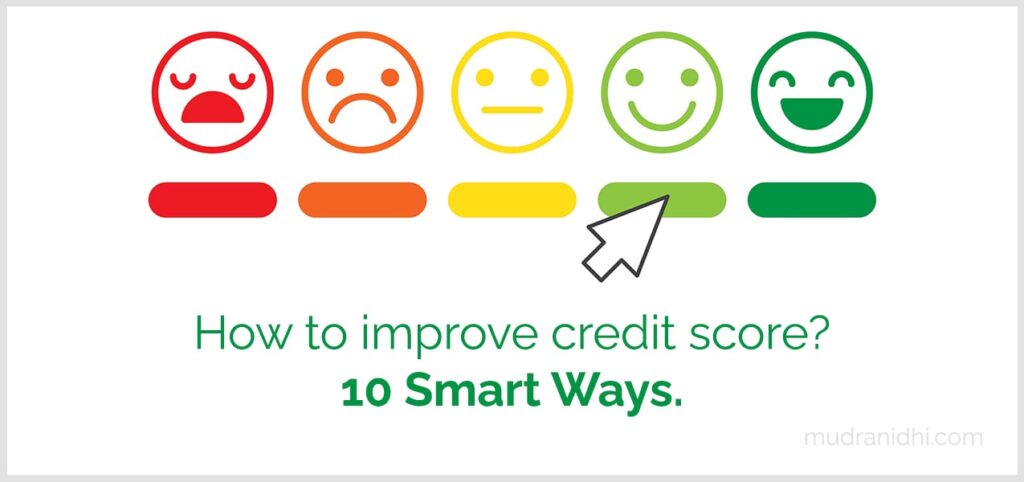A credit score is a highly important score in the range of 300 to 850 which shows your creditworthiness to a lender. A superior credit score helps you to obtain loans and obtain at a cheaper rate. Your eligibility for a generous credit card increases. Contrarily, poor credit makes it difficult to get a loan or credit car and the interest rates on the loans could be higher.
Table of Contents
Who Can Rate Your Credit Score?
Reserve bank of India has licensed the following four Credit Bureau in India:
- CIBIL (Credit Information Bureau of India)
- Equifax
- High Mark
- CRIF Experian
A credit bureau is a data collection company that is provided account information from various creditors like banks and other lenders. They process the data and provide a credit score basis one the same.
What is Good and Bad Credit Score?
A credit score under 600 out of 850 is marked as below average and is seen as undesirable by the lenders. A score in the range of 650 to 699 is generally termed as fair. If it is in the range of 700 to 749, then your credit would be termed good, while a 750+ credit puts you in the “excellent category”, and anything 800 and above is simply perfect. This is a general idea and the scoring pattern could be different for the different credit bureaus.

The credit score is dependent on five essential factors- payment history (amounts to 35% of credit score), credit use (amounts to 30% of the score), duration of credit history (amounts to 15% of score), account mix (amounts to 10% of the score), and new credit inquiries (amounts to 10% of overall score).
You would generally require a good credit score if you are thinking of taking a loan. If you want to build a perfect credit score of 800, then you would have to work towards this goal with patience and persistence. There are no miracles for instant transformation of the score, but with the inculcation of specific habits, you can see a steady increase in your credit rating.
Track Your Credit Score
If you want to have good credit then you must develop the habit of regularly checking your credit report. Regular checking would inform you of any discrepancy in the score and allow you to take corrective steps to rectify the situation.
Checking your credit score frequently does not affect the score at all.
The credit score could be low due to many reasons such as delayed payment or default of loans or credit cards. So, rectifying them at the earliest would help you increase the rating. The credit report has all the information related to your credits. So, checking the credit report would instantly alert you to any negative data regarding the credit which you can fix by taking remedial actions.
The RBI has ordered all the credit bureau to provide a free credit report once in an year. This is you can at least check your report once in an year at now cost.
Pay on Time
Timely payments of EMIs and Credit Card bills helps in maintaining a good credit score, while the vice-versa is true. Always remember to make the bills payments on time for all your loans like home loan and car loan and also remember to make timely credit card bill payments if you desire to have an attractive credit rating.
Some people might think that their credit is already damaged by outstanding debts and there is no need to act on it. Nevertheless, it is possible to rectify the situation. You can still pay back the pending money and ask the creditor to remove the collection status from the credit report after the entire payment is done. You may do a late payment owing to numerous reasons like fiscal burden or forgetfulness. So, even if you pay late, the payment will show on your Credit report, and this would establish your credibility at the time of requesting a loan. It’s best to schedule automatic payments from your credit union account to make sure that payment is never missed again.
Avoid Hight Credit Card Utilization
A good way to increase the credit score is to decrease the credit card balance. You need to spend only that amount of money from your credit card which you are comfortable in repaying back on the billing date. Try to have a low number of credit cards and limit them to just one or two so that you are easily able to monitor your spending and can pay all the bills on due dates without any getting missed.
While having a credit card and making timely payments is good for your Credit score, too much of it would negatively impact your credit health. So, try to refrain from over use of your credit card and not to use it for all the purchases. The ideal credit utilization ratio would be 30% or less. This ratio would have a positive impact on your credit score. Hence, by maintaining a low monthly balance you would be doing a favour to your Credit score.
A greater credit card limit is positive for your Credit score as it shows the lender’s trust in your paying back capacity. You can request the credit card company to increase your credit limit, but control the purchases to the same as before. An increased credit limit with lesser purchases show favourably on your credit score and reveals your high managing capacity of your funds. A greater credit limit also shows that you have more credit available at your end and this enhances your credit-worthiness.
Raise Dispute, If Any
Sometimes, the credit report may show certain discrepancies which are not your fault. If you find any such discrepancy in your credit report then you must instantly dispute it on credit bureau and get things corrected. A credit mistake can occur from any human interaction. So, the lenders are also not immune to mistakes and may enter the wrong data which could bring down your credit rating.
The financial institutions are bound by law to resolve any dispute within a 30-day period. So, rest assured, a discrepancy in your credit score would be resolved at the earliest. Once, the problem is solved, there would be an instant improvement in your credit or Credit score. In the interim, refrain from applying for new credits till your old ones are resolved as it will adversely affect your score.
Give Space to Old Debts
People usually hold a wrongful belief that old debts are useless on their credit score and tend to remove them. However, nothing can be further from the truth. Old debts are good for our credit score and so should always be mentioned in the Credit report.
These debts act as good debts because you reveal that you have successfully handled your old debts and paid all the dues in a timely manner. Hence, such old debts add weight to your credit score and sum-up a good number. In fact, a long history of good debt is highly appreciated in your Credit report. So, let these old debts pile on your Credit report and allow them to be visible on your credit report for as long as you can. Remember not to close the old accounts that show your effective repayment record and get benefitted with a good credit rating.
Similarly, the older your credit card is, the greater impact it makes on your rating. Do not be lured by new card offers and keep discarding older cards.
Avail Secure Loan
A secure loan is a loan that needs collateral as a condition of borrowing. A loan against a Gold deposit or loan against property is the best option for improving your spoiled credit score. You can borrow a small sum for any of your needs and pay in small EMI’s. The regular EMI payment will heal the credit score.
Be Cautious on Joint Applicants
You must always be cautious when going in for a joint loan application. In such a scenario, there could be a problem with your credit score even if you are working towards building an impeccable Credit score. The problem could be your joint applicant. If this person has defaulted on previous loans, then those defaults would show poorly in your individual credit report. To be free of such dangers make sure that you pay your credit card bills and loan EMIs on time and limit yourself with the joint applicant to just the joint credit terms.
Avoid Hard Inquiries
Soft inquiries do not harm the credit score but hard inquiries can. Soft inquiries or soft credit check is the inquiry made by you for checking score or any lenders for offering you pre-approved loans.
Hard inquiry or hard credit check is done when you apply for a loan or credit card and the lender dig into your account from a different risk perspective. Each hard inquiry made into your account decreases your credit score by a small number.
Don’t Hoard Credit Cards
Having credit cards and making timely payments are good for your Credit score. However, you need to limit your credit card numbers and not have too many with you. Many stores and franchises offer credit cards for discounted values wherein you may get some discount or cashback when purchasing through these cards. While these options look attractive and you may actually benefit from some monetary returns, still the process of applying for the credit card may hit your Credit report. This hit is usually small and range between 3 to 5 points, still if you are applying for too many credit cards, then their accumulated points would rise up and make a dent in your credit score.
Hence, credit card applications show poorly on your credit score if you apply for too many in a short interval of time as it sends a danger signal to the creditors and portrays you as a potential risk.
Piggyback on Your Parent’s Credit
Young people usually need time to build good credit. A good credit history normally takes five-year time of build-up. However, if you desire to have a nice Credit score then you can piggyback on your partner’s or parent’s credit. You can start this by turning into a sanctioned credit card user on your parents’ or partner’s account. This allows your parents’ or partner’s credit history to show on your credit report, yet save you from the legal responsibility of their debt. Here, you have to experience certain caution. If your partner or parents mismanage their credit, then the repercussion would be visible in your Credit report. So, you can save the situation by turning into a joint account holder to have greater responsibility and control over the credit cards and your Credit score.
Importance of Credit Score
In the present age, wants have grown up. We want many things to bring stability to our lives. In fact, even the act of making or saving money requires certain credit availability. We could easily benefit from some essential cash at the time of need through help from banks and other lending agencies. However, getting a loan or credit is not as easy as it sounds. The process of giving out loans is highly risky, especially as it amounts to some lakhs and in some cases some crores, so to keep a check on the loan eligibility of the applying candidates, the lending bodies take the help of Credit score.
A Credit score is the biggest factor that is associated with your loan eligibility. Hence, it is vital to have a high Credit rating to get the desired loan at a favorable rate of interest. When you apply for a loan, then the lenders would first look up your Credit report, and then make any productive decision. An individual with high financial management skills would benefit from a high credit rating, while those having problems paying back their bills show low creditworthiness and lending bodies usually shy away from extending loans to such individuals. A good credit score is necessary to get the desired loan. It is also important to have than loan at a better interest rate. Thus, it is vitally essential to look up your credit rating and rectify it in case of any damage before approaching a lending body. This would ensure both an easy availability of loan with higher credit limit, but also better terms and conditions.
Bad credit rating does act as a damper on your chances to get a loan. Yet, with specific practices and corrective actions, you can bring back your Credit score on track and patch-up the credit damage. This just requires a little time and work and so if you are planning to take a loan then wait for a few months before you have increased your Credit rating.
I’m Shiv Kumar, a graduate with a passion for finance, marketing, and technology. My journey into finance started with a desire to understand money management and investing.
Our main goal is to empower individuals through financial education. We believe that everyone should have the opportunity to build a strong financial foundation. Whether you’re a seasoned investor or just getting started, we provide articles, guides, and resources to help you navigate the financial landscape.
I invite you to join our community of financially savvy individuals. Feel free to ask questions, engage with our content, and explore the topics that matter to you. Together, let’s take control of our financial futures.




